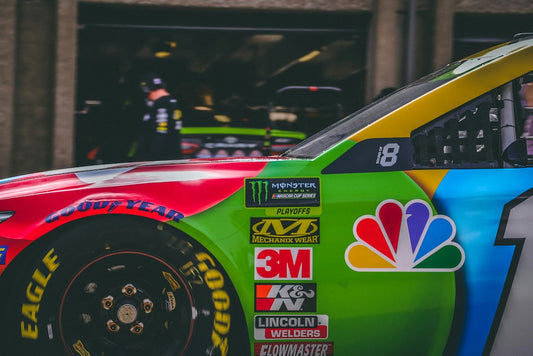Economic Ups and Downs Shake NASCAR's Path

NASCAR is a popular motorsport in the United States. Known for its high-speed races, passionate fans, and thrilling moments, NASCAR has become a significant part of American culture. However, like any industry, NASCAR faces its fair share of economic challenges and opportunities.
In this blog post, we will explore the impact of these economic factors on NASCAR and its stakeholders, including declining attendance, the role of sponsorship, the influence of technology, the importance of broadcasting rights, and the overall economic challenges faced by the sport.
Declining Attendance
One of the significant challenges NASCAR has been facing in recent years is declining attendance at races. There are several factors contributing to this trend. Firstly, the high costs associated with attending a race, including ticket prices, travel expenses, and accommodation, have made it less accessible for some fans. Additionally, the rise of alternative entertainment options, such as streaming services and esports, has provided fans with more choices for their leisure time. The decline in attendance has implications for NASCAR and its stakeholders, including reduced revenue from ticket sales, lower merchandise sales, and a decrease in the overall fan experience at the races.
Sponsorships: Opportunities for Growth
Sponsorship deals play a crucial role in NASCAR's revenue generation. These deals not only provide financial support to the teams but also offer exposure and marketing opportunities for the sponsors. However, there are both benefits and drawbacks to sponsorships for teams and sponsors. On the one hand, sponsorships can provide teams with the necessary funding to compete at the highest level and invest in research and development. On the other hand, teams may become overly reliant on sponsorship money, which could jeopardize their financial stability if a sponsor pulls out. One successful example of a sponsorship in NASCAR is Monster Energy's partnership with the sport, which has brought increased visibility and excitement to the races.
Technology on NASCAR's Economics
Technological advancements have significantly influenced the economics of NASCAR. From data analytics to car technology, these advancements have improved the sport in various ways. Data analytics, for example, allows teams to analyze race performance, make strategic decisions, and enhance the overall fan experience. Car technology advancements have also improved safety and performance, making the sport more appealing to both fans and sponsors.
However, implementing new technologies also comes with costs, such as research and development expenses and the need for skilled technicians. It is crucial for NASCAR to carefully consider the costs and benefits of implementing new technologies to ensure the sport's long-term sustainability.
Broadcasting Rights: A Key Revenue Source
Broadcasting rights are another essential source of revenue for NASCAR. The sport relies on TV networks and streaming platforms to broadcast races to millions of viewers worldwide. The importance of broadcasting rights cannot be overstated, as they not only provide significant revenue but also play a crucial role in attracting sponsors and maintaining fan engagement. However, NASCAR faces challenges in terms of TV ratings and changing media consumption habits. As more people cut the cord and switch to streaming services, the sport needs to adapt and find innovative ways to reach its audience. One successful example of a broadcasting partnership is NASCAR's collaboration with Fox Sports, which has brought the sport to a broader audience through its extensive coverage.
The Economic Challenges
In addition to declining attendance and changing media consumption habits, NASCAR also faces other economic challenges. Reduced TV ratings have resulted in lower advertising revenue, making it more difficult for the sport to attract sponsors. Moreover, the high costs associated with operating a team, including driver salaries, car maintenance, and travel expenses, put financial strain on both teams and tracks. Some teams and tracks have even struggled financially, leading to closures and layoffs. These challenges have a significant impact on the sport and its stakeholders, including job losses, reduced investment in research and development, and a decrease in the overall competitiveness of the sport.
Overcoming the Challenges: Strategies for Success
To overcome the economic challenges facing NASCAR, the sport needs to embrace potential solutions. Adapting to changing consumer behaviors is crucial, which includes finding ways to make races more affordable and accessible to a broader range of fans. Embracing new technologies, such as virtual reality and augmented reality, can also enhance the fan experience and attract a younger audience.
Additionally, NASCAR needs to focus on building strong relationships with sponsors and providing them with innovative marketing opportunities. Successful examples of NASCAR teams and tracks that have overcome these challenges include the revitalization of the Darlington Raceway and the success of teams like Joe Gibbs Racing and Hendrick Motorsports.
Conclusion
NASCAR's path has been shaped by economic ups and downs. The sport faces challenges such as declining attendance, reduced TV ratings, and high operating costs. However, NASCAR also has numerous opportunities for growth, including sponsorship deals, technological advancements, and broadcasting rights. By adapting to changing consumer behaviors, embracing new technologies, and fostering strong partnerships with sponsors, NASCAR can overcome these challenges and continue to thrive.
It is essential for all stakeholders, including fans, teams, tracks, and sponsors, to work together towards a successful future for NASCAR. Together, we can ensure that NASCAR remains a beloved motorsport in the United States and continues to captivate audiences worldwide.





